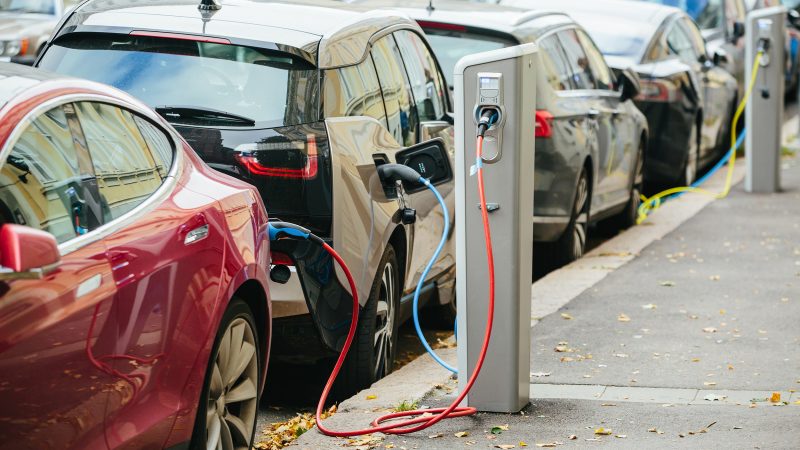
Ed Miliband will set out Labour’s vision for a green economic recovery from the coronavirus pandemic and call for an “electric vehicle revolution” backing car manufactures, creating jobs and boosting zero-emission car ownership.
In a speech delivered online on Thursday morning, the Shadow Business, Energy and Industrial Strategy Secretary is expected to tell those watching that tackling the climate emergency is an “absolutely central mission” for his party.
During the address, Miliband will warn government ministers that “what we cannot do is put a green coat of paint on our unequal, insecure economy”.
“Every worker whose job might change, every consumer who may face a change, has got to be at the centre of our concerns,” he will say. “This is the DNA of Labour: Green and fair. Green and red together.”
He will emphasise that constructing gigafactories to build a strong domestic battery supply chain is crucial for the future of our automotive sector, and criticise the Tories’ lack of ambition. Under the plan, the opposition party is proposing to:
- “Back automotive manufacturers and create jobs by part-financing the creation of three new, additional gigafactories by 2025, providing greater security for the sector and shoring up Britain’s global leadership in the electric vehicle market;
- “Make electric vehicle ownership affordable by offering interest-free loans for new and used electric vehicles to those on low to middle incomes to remove the upfront cost barrier; and trialling a national scrappage scheme; and
- “Make it easier for people to drive an electric vehicle, wherever they live, by accelerating the roll-out of charging points on streets and targeting areas left out like Yorkshire, the North West and the West Midlands.”
Commenting ahead of his speech, the Shadow Business Secretary said: “To back the car industry and create jobs, Labour would bring forward ambitious proposals to spark an electric vehicle revolution in every part of the country.
“By extending the option to buy an electric car to those on lower incomes and accelerating the roll-out of charging points in regions that have been left out, we would ensure that everyone could benefit – rather than bake in unfairness.
“And we would invest in securing the industry’s future. While it’s right that government has said the sale of new petrol and diesel cars will end, it’s wrong it is imposing a massive transition on our manufacturers from Whitehall then washing its hands of responsibility.
“It’s not fair, it will damage our manufacturers, and it will mean losing out on the chance to be the world-leader in the electric vehicle market. Labour would back our manufacturers and the communities with proud histories in the industry, but the government is asleep at the wheel.”
Labour for a Green New Deal welcomed the announcement but argued investment in EVs must come with “expanded, publicly owned public transport to reduce private car use and with commitments to ensure justice in global supply chains”.
Miliband told Sky News viewers last year that “we get bang for our buck if we invest in green”, urging the government to seize the opportunity to both provide jobs for the UK and help the country combat the climate emergency.
The shadow frontbencher joined Anneliese Dodds challenging ministers to ‘Build it in Britain’ and support the creation of 400,000 new jobs when they proposed a green economic recovery from the coronavirus health crisis in November.
The vision for a drive towards a clean economy, set out by Labour ahead of Chancellor Rishi Sunak’s planned comprehensive spending review later in the same month, focused on the crucial UK manufacturing sector.
The job-creating initiative being proposed by the UK Labour Party would involve bringing forward planned capital investment – at least £30bn over the next 18 months – and dedicating the funds to low-carbon industries.
The rapid stimulus package would aim to recover jobs, retrain workers via an emergency training programme to equip those affected by Covid unemployment, and rebuild business with the creation of a national investment bank.
The green-conscious investment bank, a policy promoted by John McDonnell when he was Shadow Chancellor, would work similarly to those in other countries and ensure that investment always supported the path to net zero.
Miliband criticised the government for offering “rebadged funding pots and reheated pledges” with the unveiling of the Prime Minister’s ten-point proposal to tackle climate change last year, and stressed the need for an “ambitious plan”.
The government has costed the ten-point plan published last year at £12bn, and the proposals include several already announced pledges, such as banning the sale of diesel and petrol vehicles by 2030 and quadrupling offshore wind power.
Following the publication of the much-delayed programme, first trailed by the Prime Minister at the 2020 Tory Party conference, the opposition party highlighted that only £4bn of the £12bn package actually represents new spending.
The Institute for Public Policy Research welcomed the decision within Boris Johnson’s plan to phase out the sale of diesel and petrol cars by 2030 but called on him to go further with greater investment to reach the net-zero emissions target.
A report from the think tank calculated that the UK needs an extra £33bn in annual investment to reach its goal. The additional £4bn committed by the government in this plan represents 12% of what the organisation has argued is needed.




More from LabourList
‘Labour is being badly misled on housing’
Reeves bets on patience over populism
‘Energy efficiency changes must work for older private renters’